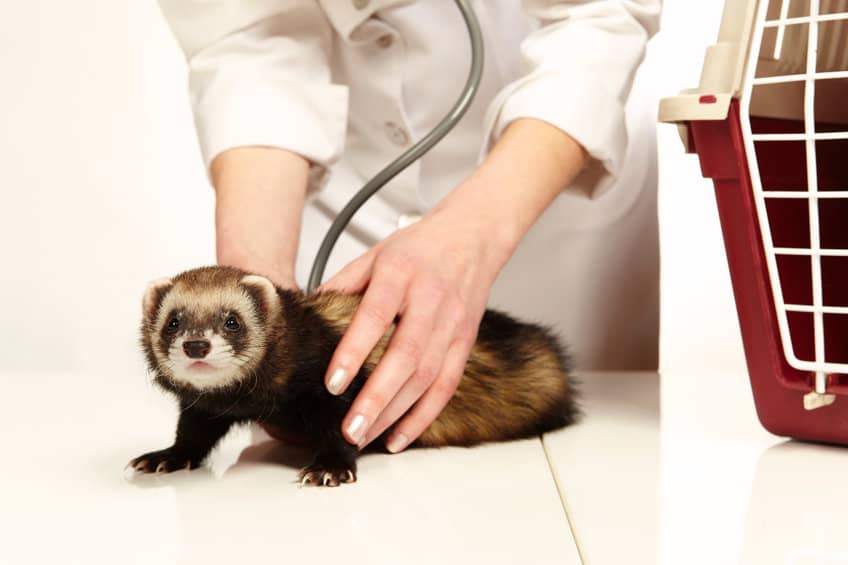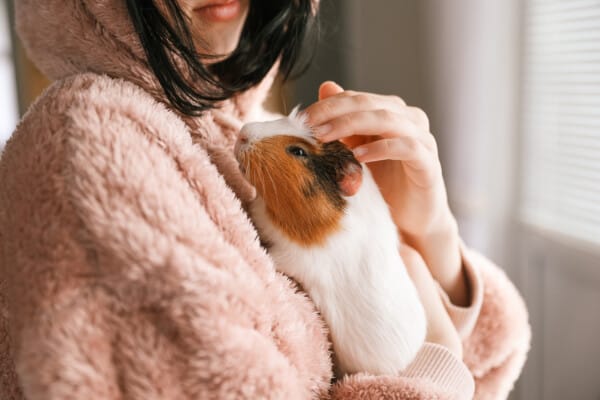When you bring home a dog or a cat, most people expect to take that animal to the vet regularly for check-ups and shots, but this is not always the expectation for small pets like ferrets. However, your ferret will also need to go to the vet regularly for a variety of different things, including shots.
In this article, we are going to take a look at some of the questions you may have regarding your ferret and vaccines, including which shots your ferret needs, the vaccination schedule you need to follow, any side effects that you should be on the lookout for, and other reasons that you may need to take your ferret to the vet.
Do Ferrets Always Need Shots?
Yes, it is recommended that your ferrets get shots to help prevent a few especially dangerous conditions. There are two main shots that your ferret is going to need: distemper and rabies. Both of these shots need to be given regularly (every one to three years, depending on the specific vaccine that you and your vet decide to use).
First, let’s talk about the rabies vaccine. There are three rabies vaccines that are currently approved by the USDA for ferrets. These are Defensor 1 or 3, IMRAB 3, and Nobivac 1-Rabies. Your vet will be able to provide you with more information about the pros and cons of each specific vaccine.
Your ferret should not be given any of the rabies vaccines until he is at least three months of age. If your ferret is younger than that when you bring him home, you will need to wait a little while. On the other hand, if your ferret is older than three months, he may already have the vaccine, but if not, you will need to go get it as soon as possible. From that point on, you will need to give it to your ferret every 1 to 3 years.
The other type of vaccine that your ferret is going to need is a distemper vaccine. There is one canine distemper vaccine that has been approved for ferrets, and it should be given to your ferret at 8, 12, and 16 weeks. When you adopt your ferret, you likely will only have to worry about the 16-week shot and maybe the 12-week shot. You will also probably need to get your ferret an annual booster for distemper.
Why Do Ferrets Need Rabbies and Distemper Shots?
So why does your ferret need a rabies vaccine? Well, rabies is a vaccine that can affect pretty much all animals and humans. It is transferred when one animal with rabies bites another animal (animals with rabies are prone to bite since rabies tends to make animals rather irritable.) If your ferret ends up contracting rabies, it is often fatal. A rabies vaccine will help prevent your animal from contracting this viral disease even if bitten by another animal who does have it.
The vaccine for distemper is important because distemper is an extremely infectious disease. Animals do not even have to come into direct contact with another animal with distemper to contract it. It is also often fatal for ferrets and other animals. However, if your ferret is properly vaccinated, he should not catch the disease even if he is around other animals that caught it.
Ferret Vaccination Schedule
In the previous section, we provided you with a lot of information about the two different vaccines that your ferret needs. Here is a simplified schedule for both vaccines so you can easily tell when your ferret is going to need his shots.
Rabies Vaccine
- first time: 3+ months old
- boosters: every 1 to 3 years depending on the vaccine
Distemper Vaccine
- first time: 8 weeks
- second time: 12 weeks
- third time: 16 weeks
- boosters: every year after that
How Much Do Ferret Vaccinations Cost?
The exact cost of your ferret’s vaccinations depends on the vet that you go to, in addition to what vaccine you end up getting. They tend to be generally affordable, costing between $15 to $20 a vaccine.
However, there are other vet costs that you need to be aware of. Once your ferret is through the kit (baby) stage, it is recommended that he goes to the vet for a check-up about once a year. At these check-ups, your vet will likely take blood work, take a urine sample, and run several tests to check for parasites or other ailments.
When your ferret starts to get older (over 2 or 3 years old), you probably should start taking your ferret to the vet twice a year rather than just once. While vet visits can feel rather pricey, you will save money in the long run if you catch any problems early on. The exact cost of a vet visit does depend on where you live.
At your first vet visit, you will need to provide your vet with a good bit of information for the medical records. You will need to tell your vet where you adopted your ferret, what his age is, what his sex is, whether he is desexed and/or descented, any problems that you have noticed (health or behavioral), and his previous vaccination history.
These vet visits are usually when your ferret will receive any booster shots that he needs. In a later section, we will touch on reasons you might need to take your ferret to the vet other than wellness check-ups.
If you are concerned about the cost of medical bills for your ferret, you can consider getting pet insurance which will help you pay for any vaccinations/tests that your ferret regularly needs in addition to any major/surprise medical expenses that could come up if your ferret gets sick.
What To Do Before And After Vaccination?
Before vaccinating your ferret, you are going to need to get his or her vaccination record from the previous owner or the organization you adopted your ferret from. You should ask for this record while going through the process of purchasing/adopting your ferret, and if they cannot provide one, you likely want to go to a different organization to get a ferret.
The reason that you need to get your ferret’s vaccination record is so that you do not accidentally double vaccinate your ferret. Double vaccination can mean that your ferret is a lot more likely to experience side effects/problems when receiving the vaccine. You and your vet will need to continue this record with all vaccines and boosters that you give your ferret in the future.
There is not a whole lot that you have to do after your ferret is vaccinated. If your vet provides you with instructions on certain things that you need to do/be on the lookout for, you should definitely be sure to follow those instructions. You also want to be on the lookout for any side effects, which we will go over more in the next section.
What Side Effects Are There and How Do You Manage Them?
Most of the time, ferrets will receive their vaccine and be perfectly fine except for a few minor side effects like fatigue, which may be more from the exciting trip to the vet than anything else. However, it is entirely possible that your ferret could receive a vaccine and have a bad reaction to it due to an allergy or something else.
Ferrets are more likely to have severe reactions to vaccines than dogs or cats, so it is often recommended that you only give your ferret one vaccine at a time (rabies or distemper) rather than both in one visit. Some vets will even test ferrets for allergic reactions before vaccinating ferrets due to the potential negative side effects.
The most common side effects that ferrets experience after getting a vaccine are vomiting, diarrhea, itchiness, and fever. If your ferret starts to show these reactions, you may want to take him back to the vet or at least call your vet to see what he thinks about the reaction.
Generally, the adverse effects should not last for more than 8 hours after receiving the shot. Additionally, you may still want to keep him isolated from any other pets/ferrets you have until the effects diminish.
How Often Do Ferrets Need To Go To The Vet?

Other than vaccinations and regular/annual check-ups to test for things like parasites and disease, there are other reasons that you might want to take your ferret to the vet. Some of these reasons only warrant a phone call or can wait till your next annual visit, but others are more concerning and should be dealt with immediately. The following are just some reasons why you may want to reach out to your vet:
- Any signs/symptoms that your ferret might be ill like vomiting, extreme fatigue, coughing, and sneezing.
- If your ferret is having a litter box problem. This includes things like constipation, diarrhea, odd-smelling urine, blood in urine, etc.
- Behaviors that indicate ear mites or ear infections such as scratching or head shaking.
- Coat or skin changes that are not caused by the change of the season.
- Any sudden weight changes.
- Behavioral issues. While this is not necessarily a medical problem, your vet will likely have tips/advice that could help you out.
- You should also consider reaching out to your vet if you need to change your ferret’s diet/food for any reason.
Of course, this is in no way a comprehensive list of every single thing that you might want/need to reach out to your vet about. Remember, your vet is there to help you and your ferret, so if you have any concerns or questions, it is always better to be safe than sorry, so call your vet with any questions and concerns that you have.
Who Can Vaccinate My Ferret?
Pretty much all animals should only be treated/get their vaccinations from a vet with experience. Ferrets, however, tend to be even more complicated compared to other common pets like dogs or cats. For this reason, you are going to want to find a vet that has experience treating ferrets to give your ferret his vaccines and any other medications/medical care that your ferret needs.
Are Ferret Vaccinations Licensed?
The licensing of ferret vaccinations does vary from place to place and between different licensing organizations (USDA, FDA, etc.). In the United States, there is licensing for both the canine distemper and rabies vaccine for ferrets; however, in the UK, they have to use a dog distemper vaccine instead as the canine is not yet approved.
What is a Vaccination Interval?
A vaccination interval is the time/frequency that your ferret is going to need to get a booster vaccine. For most pet vaccines, this interval is about a year, though for some, it may be longer/shorter. Your vet should be able to provide you with the specific vaccination intervals for your ferret’s vaccines.
Are Reactions to Vaccinations Common?
Reactions to vaccines are not so common or severe in ferrets that you need to avoid vaccinating your ferret; however, ferrets do tend to have reactions more often than other animals like a dog or a cat. For these reasons, your vet may want to test your ferret for an allergy first by giving him a small dose before moving on to the full dose. Your vet will also likely want to keep your ferret at the vet for 20 to 30 minutes after giving the vaccine to watch for any actions.
Resources:
- Viral diseases of Ferrets, Isabelle Langlois
- Cats Differ from Mink and Ferrets in Their Response to Commercial Vaccines: A Histologic Comparison of Early Vaccine Reactions, E. Eggers Carroll, R. R. Dubielzig, R. D. Schultz
- Other Systemic Diseases, James G. Fox
- Ferret Preventive Care, John R. Chitty, Cathy A. Johnson-Delaney
Contents
- Do Ferrets Always Need Shots?
- Ferret Vaccination Schedule
- How Much Do Ferret Vaccinations Cost?
- What To Do Before And After Vaccination?
- How Often Do Ferrets Need To Go To The Vet?
- Who Can Vaccinate My Ferret?
- Are Ferret Vaccinations Licensed?
- What is a Vaccination Interval?
- Are Reactions to Vaccinations Common?













